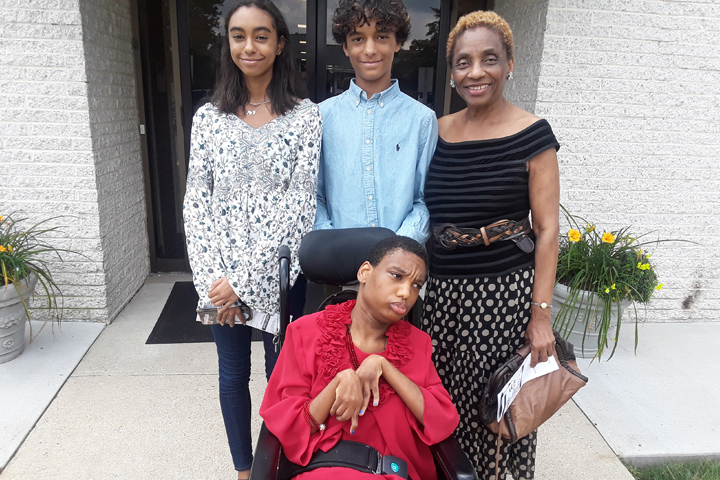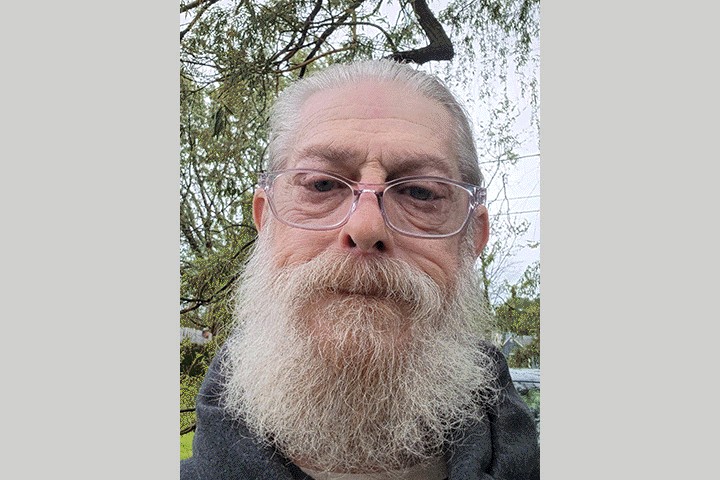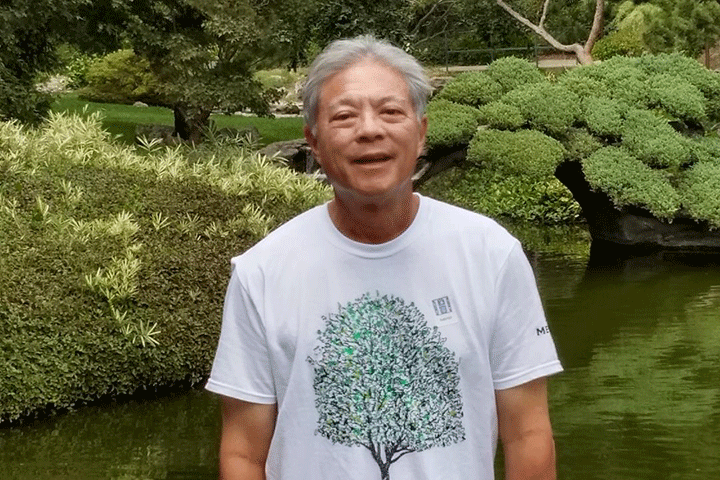Gift of Another Breath

- Symptoms lead to pancreatic neuroendocrine cancer diagnosis
- Whipple surgery to remove the tumor
- Chemotherapy with Xeloda and Gemzar
- Radiation treatment
Imagine writing your “Celebrating the Life of” program? I wrote mine and even identified who was going to do my homily, eulogy, and repast.
In June 2016, I was standing on the banks of the Red Sea of life pondering how to cross that massive body of water. Why was I in this dark place? I had just heard the words “you have aggressive pancreatic cancer and it’s in your lymph nodes.” I was dumbfounded, couldn’t move from my chair, and forgot to ask what stage. After the doctor left the room, I saw his nurse passing by and that’s when I asked her to find out what stage it was. “Stage II,” she replied.
My Body Spoke to Me and I Listened
One month prior, I had my annual checkup with Dr. Padmaja Udapi (now retired) and had perfect health. Shortly after, I developed itching in the palms of hands, then I became extremely jaundiced, and experienced rapid weight loss over a period of four months, from 164 to 127 lbs. I was itching to the point I felt I wanted to take off my skin—couldn’t sleep at nights. My husband heard me crying out “I can’t sleep.” I also became extremely jaundiced and if driving the car on a hot day, I had to cover the steering wheel with something to avoid my hands getting burned, plus I started experiencing rapid weight loss and my coworkers stopped easily recognizing me.
Dr. Udapi did not do guesswork nor “dilly-dallied” when I revisited and told her of my symptoms. She immediately had me do blood work and referred me to Capital Digestive Care; the doctors there arranged for a scan. The scan showed there was a cyst, but the type was unknown. So, I went to University of Maryland Hospital in Baltimore for an endoscopy; afterwards I was told I had duodenal cancer. The doctor said it would be an easy fix because it had not penetrated any organs. The cancer was sitting at the mouth of my pancreas and liver.
Four weeks after my diagnosis, Whipple surgery was performed by Dr. H. Richard Alexander (a renowned surgeon, now at Rutgers Cancer Institute in New Jersey), at University of Maryland Hospital. I spent almost two weeks in the hospital and then recovered at home for two weeks. I did not know it but by the time I had surgery the cancer had penetrated my pancreas and spread to my lymph nodes. When I went back for my after-surgery follow-up I was told at that time that I had pancreatic neuroendocrine cancer. I am thankful for the wisdom of the medical staff for not giving me the bad news after surgery. If I was told while in the hospital or while recuperating at home, I would not have held on to HOPE because I knew no one who survived pancreatic cancer.
The Importance of Trust
My endoscopy, Whipple surgery, and treatments were performed at the University of Maryland Hospital, Baltimore, Maryland. My oncologist Dr. Yixing Jiang was primarily in charge of my overall treatment plan, while Dr. William F. Regine, Chair, Department of Radiation Oncology, and Martha Francis, CRNP, took care of my radiation treatment plan. I felt comfortable asking questions about the proposed treatment plan and all three listened to my concerns and allayed my fears.
This team continues to monitor my progress. It is important that I state that I am not intimidated by my medical team. I am so thankful that I don’t have any horror stories to share about my interactions with them. As a matter of fact, when I go for my follow-up appointments CRNP Francis calls Dr. Regine using the words “she is here.” Provided he’s not in a critical meeting, he comes by to chitchat and we engage in laughter. The team of Jiang, Regine, and Francis are the best oncology medical team EVER!
Treatment Plan
After my surgery, I had traditional treatment of chemo and radiation. I was offered the option of clinical trials prior to having radiation but I didn’t like the option. I was told that if the trial was unsuccessful, I would not have an option to start radiation.
First, I had a port inserted and although I no longer do treatments, I still have it since my veins are hard to find. My plan is to take it out at the end of my five-year medical surveillance. I get the port flushed every two months.
Second, I had chemo for six months, taking daily Xeloda tablets for three weeks followed by one week off, along with a Gemzar infusion once weekly. Side effects created sensitivity in my feet and the tip of my fingers. My fingernails and palms of my hands got black, I had difficulties closing window blinds and my skin tone changed to a darker shade. There were times when I felt like I was walking on needles. Due to side effects, the Xeloda dose was reduced.
Third, one day each week my chemo intake was very high. There were limited times when my white blood cell count was not the best and the infusion dose of Gemzar was lowered. The beauty here is that Dr. Jiang did not share her concerns with me. However, at the end of my treatment protocol and when I got the “perfect report” she told me that there were times she was concerned. In my opinion that was “true” wisdom.
At the end of six months and after my “perfect health” report, I started daily radiation five days each week for five and a half weeks. I also continued taking Xeloda on weekdays, with weekends off.
During treatment, I did not experience nausea or upchucking nor hair loss. My hair started thinning about five months after treatment began. My appetite remained quite stable. If I did not tell anyone I was going through a rigorous treatment plan, no one would have known, except, of course, family and friends who knew me well.
Success Report
The good news came at the end of my six-month treatment protocol: on April 4, 2017 I was told that I have perfect health! Since that time, I’ve been excitedly given that same report of perfect health 11 times. I’m confident that these positive reports will continue indefinitely. The latest report was in July of 2020 and it reads: THYROID, HEART, BONES NORMAL, NO DISEASE IN THE CHEST, LIVER, ABDOMEN, PELVIS, ADRENALS, SPLEEN, BLADDER NORMAL. BOTTOM LINE: NO NEW, NO PROGRESSIVE, NO METASTATIC DISEASE FOUND. I have been off all drugs or maintenance treatment plans since 2017.
My doctors now want to get rid of me. My visits started out being quarterly and a few months ago, the medical team told me that they no longer want to see me on a semi-annual basis starting next year because I do not have cancer. The visits in the future would be yearly and then NO MORE! I give God the praise.
Positive Thoughts—My Faith
Yes, I hear stories that Jane Doe or John Brown (figuratively speaking) had cancer and it came back with a vengeance and they are no longer living. I speak to myself, “That’s not my destiny.”
Yes, I’m fully aware that I am battling against negative survival rate statistics. At the end of my treatment protocol, when I told one of my non-oncology doctors that I had aggressive pancreatic cancer, she later told me that she said under her breath, “I’ll see you in the next life.” When I recently visited her, she announced to her staff that this is her miracle patient.
Only 10 percent make it to five years and I’m in that 10 percent channel. June 30th of 2021 will mark my five years and I am confident (because of my faith) that I will join the 10 percent club of pancreatic cancer survivors, who successfully live beyond five years.
Support System: Family and Friends
Without the support of my husband, Ira, my children Dino and Raquel-Ann (who was born with cerebral palsy, is nonverbal, requires total care, and is in her 30’s), grandchildren Cierra and Chase, and daughter-in-law Cristy, my recovery would have been less successful. I also had a strong support system of family, intimate friends, and acquaintances who often called encouraging me to “KEEP FIGHTING.” They also presented my name to different prayer groups. It was during this season of chemotherapy and radiation that I started journaling, which birthed my book Gift of Another Breath: You Have Pancreatic Cancer. I wanted my grandchildren to put my book in the family archives for future generations to be cognitive of my health journey.
Lifestyle
I learned about herbs and teas and their value. I make smoothies with carrots, beets, aloe vera, and myriads of other earth products. I also enjoy daily teas with lemon, garlic, and ginger. My goal each day is to maintain a healthy immune system by incorporating faith, sunlight, rest, exercise, love, kindness, compassion, dietary self-control, gratitude, thankfulness, drinking water, and dancing to lively Jamaican music. These activities buoy my spirit and keep my mind positive.
In November I was kept busy providing pancreatic cancer awareness information. I did about seven presentations by both teleconference and by Zoom, mainly to church prayer line groups. My focus was on four different things: (a) to share possible symptoms, because I had itchy skin, jaundice, and weight loss; (b) to share the statistics; (c) to ask for a scan if doctors are conducting a guessing game. A perfect example was a lady who was referred to me after her friend heard my story on the prayer line. She shared that she had a change in bowel activities and the doctor believed maybe it was “indigestion.” She insisted that she wanted a scan, and yep, it was cancer and she is taking treatments at Walter Reed; and (d) information on different treatment protocols and resources which people can find from Let’s Win and Pancreatic Cancer Action Network (PanCAN).
What primarily helped me to pull through treatment and what’s keeping me healthy and positive since I am no longer in treatment for over three years? It’s primarily my Faith. In addition, I keep a merry heart coupled with a positive mental attitude.
When I’m asked “Angie, how are you doing,” my reply is “All is well.” I’m using my mouth to plant positive seeds of healing in pursuit of continued health—it’s like watering a garden.
Watch Angella tell her story in “I’m Still Here.”






